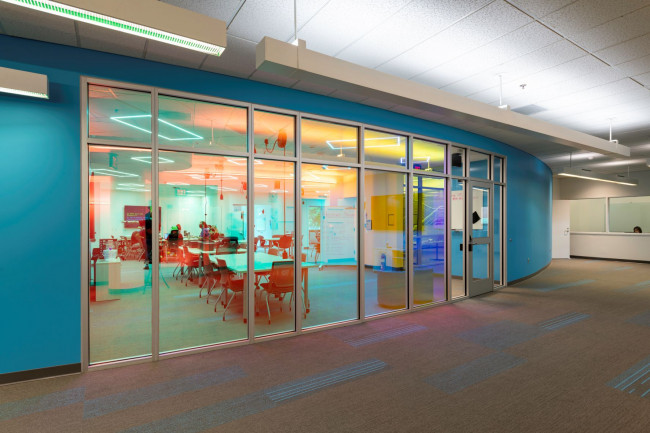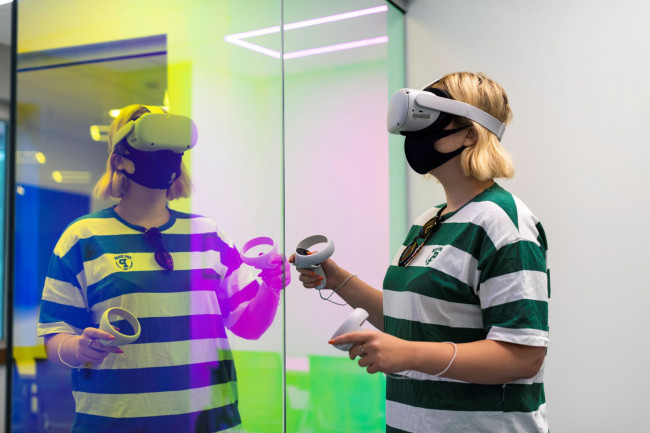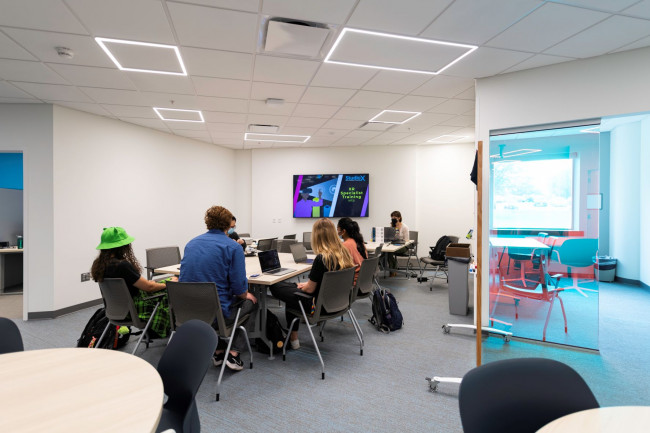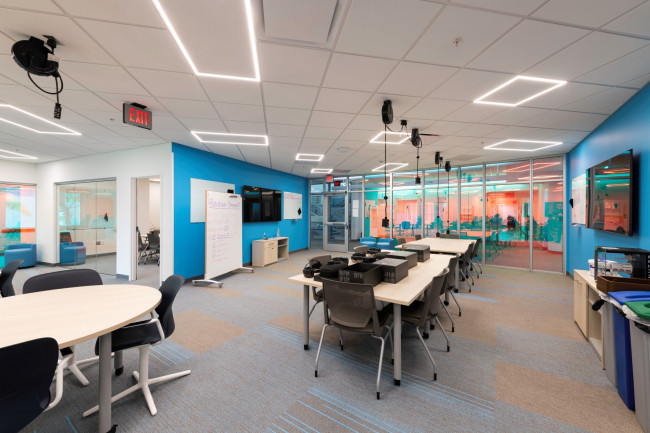
In the Northern Hemisphere, winter doesn’t officially begin until December 21. That means, as of this story’s publication, it’s still fall. THAT MEANS it’s still Hot Library Fall.
Tis still the season for fresh library spaces at the University of Rochester! We welcomed Hot Library Fall in September by warming our souls with before-and-after photos of the new Gleason Library. And in October, we got hygge in the Edward G. Miner Library’s refreshed Reading Room. To close out the libraries’ glow-up season, we’re stepping into the extended reality (XR) wonderland that is Studio X.
First, it’s important to note that Studio X is not officially open.
Everything that’s currently happening in the space is part of a “soft launch” or, for all intents and purposes, an extra-long pilot session. Rochester’s fall semester has allowed the XR hub to see how the space and technology perform when in use, better understand the extent of student and faculty needs, and evaluate current services and where an increase in technical expertise is required. Emily Sherwood, director of Studio X, says there was no way they could have gotten the space, physically, to where it is now and be fully functional programming- and service-wise.
“The soft launch was a must,” Sherwood says. “We’re slowly ramping up our offerings and support and filling critical staff positions.”
In the coming spring semester, Studio X will be hiring and training someone to manage the space and student staff members and a high-end technology expert who will lead workshops, mentor student staff, and help with research projects.
The vision that made Studio X what it is now and what it aspires to become, plus philanthropic interest generated by the Evans Lam Challenge, helped secure a $400,000 grant from the Fred L. Emerson Foundation. Based in Auburn, NY, the foundation has “a long tradition of supporting private higher education in Upstate New York.” That tradition has previously benefited the University of Rochester Libraries for projects that include the Seward Family Digital Archive.
“I’m really excited that the Emerson Foundation is local,” says Sherwood, “and that they see the value in XR and how it’s able to have an impact on our students. They understand how valuable access to these emerging technologies is to our students’ future careers and the growth of our community.”
Despite being in a “ramp-up” phase, Studio X is already having a substantial impact on the River Campus. Sherwood and her staff look to build on their existing success in their current programming, course integrations, and projects.

Programs
If you think XR is solely for people who understand how the blockchain works, Studio X is prepared to disabuse you of that notion. There are already several programs that allow students and faculty and staff members to easily enter this world through experiences, explorations, and experimentation.
Experience
- Voices of XR: A speaker series—made possible in part by support from Kathy McMorran Murray, University of Rochester life trustee and former member of the libraries national council—that brings immersive technology scholars and professionals from a variety of sectors, including medicine, the arts, accessibility, and education, to the University community. Examples of past speakers include Carl Domingo from Unity Technologies and Steven Christian, owner of Iltopia Studios.
- Drop-in Fridays: Just like it sounds, the University community is invited to just drop into Studio X for showcases of faculty and student research, quick tutorials on XR tools and platforms, and opportunities for hands-on experiences.
Explore
- Intro to XR: A standalone XR for session for beginners to demystify XR technologies, explain their history, and demonstrate their uses across disciplines.
- Office Hours: Studio X staff are available in-person and virtually to answer questions and troubleshoot problems.
Experiment
- Blender Basics: A workshop that focuses on asset creation with the 3D modeling software Blender.
- Unity Basics: Also a workshop. This one is a three-part series that covers user interface, the basics of coding, the physics engine, and AR basics.

Course Integration
Before Studio X, students explored XR on cell phones or devices they had on hand. Now they can use technology made for this type of work and learn from Studio X staff members and Karp Library Fellows. Sherwood’s ultimate hope is that the grant will enable them to develop XR clusters.
But some faculty members have already begun using the space for their courses. Upon seeing the space and discussing the programming available, Andrew White, associate professor of chemical engineering, said, “I wish this existed three years ago.” Other faculty are equally pleased it exists now, which is why Studio X has already hosted courses in digital media studies, religion and classics, and these two courses:
CSC 216/416: AR/VR Interaction Design
Zhen Bai, assistant professor of computer science, offers the course to give students a fundamental understanding of XR technologies and the opportunity to use them to solve real-world problems. The value of Bai’s students having access to Studio X is the access to a variety of XR devices and staff that allow them to learn through hands-on activities. It also gives Bai the ability to develop XR-based assignments and group projects as well as codesign workshops with the Studio X team.
Bai, who was among the faculty members engaged early in Studio X’s design phase for feedback, appreciates how well the space realizes the vision. “They did an excellent job building a convenient, collaborative hub for the Rochester community to get exposure to AR/VR and increase their digital literacy,” says Bai.
WRT 105: Uncertainty
Kate Phillips ʼ15, associate professor in the Writing, Speaking, and Argument Program, gave her first-year students the prompt: Can virtual reality experiences give us the experience of being wrong? It’s part of her class’s theme of “Uncertainty” and its importance in the scientific process and other academic research. Through the use of VR headsets, students can learn experientially about old philosophical thought experiments, such as whether our senses can be systematically deceived and what that means for knowledge that relies on observation.
“One of the things that I really appreciate about Studio X is how intentionally interdisciplinary it is,” Phillips says. “It’s another space where you have the opportunity to understand different approaches to answering questions we’re interested in and things we’re trying to learn.”

Projects
There are several humanities-related “test projects” that Studio X will oversee. These will provide the University community with opportunities to learn about XR and help build XR experiences while they are connecting them to the Rochester community, its history, and its unique collections.
Medieval alchemy lab. Working with the Rossell Hope Robbins Library, Rochester’s non-circulating medieval studies library, students are virtually recreating a historical medieval alchemy lab. Information about lab items and chemical reactions is drawn from alchemy and poison manuscripts held in Robbins Library. Students who visit Studio X and want to learn how to use VR software, like Blender and Unity, can practice by building items that can be added to the alchemy lab.
Virtual Mount Hope Cemetery. Every summer, local high school students participate in a summer program at the University that introduces them to different components of humanities research. This coming summer, they will be working with Studio X to recreate a portion of Mount Hope Cemetery in XR for a public history exhibit. Beyond learning 360-degree video capture, they will also do archival research on the people buried in that portion of the cemetery and the time in which they lived. This project is a prototype that could be expanded and shared. ∎
For more information on current Studio X programs or engaging with Studio X, contact director Emily Sherwood at esherwood@library.rochester.edu. If you are interested in contributing to Studio X’s growth, contact Pamela Jackson, senior director of Advancement for the River Campus Libraries, at pamela.jackson@rochester.edu.
Enjoy reading about the University of Rochester Libraries? Subscribe to Tower Talk.

